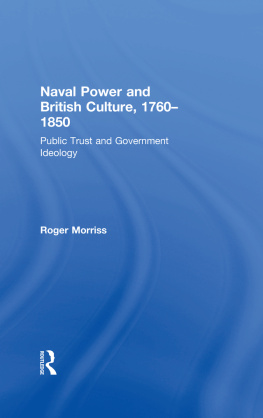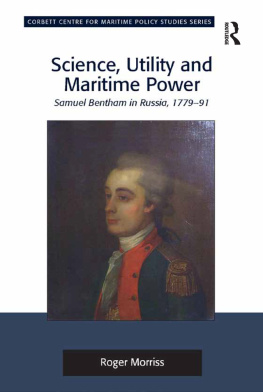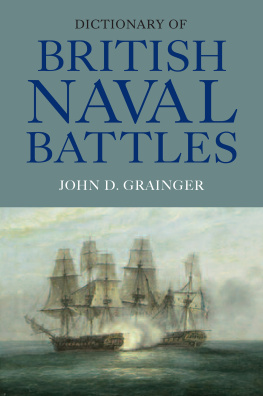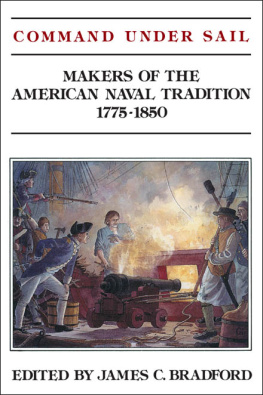First published 2004 by Ashgate Publishing
Published 2016 by Routledge
2 Park Square, Milton Park, Abingdon, Oxon OX14 4RN
711 Third Avenue, New York, NY 10017, USA
Routledge is an imprint of the Taylor & Francis Group, an informa business
Copyright 2004 Roger Morriss
Roger Morriss has asserted his moral right under the Copyright, Designs and Patents Act, 1988, to be identified as the author of this work.
All rights reserved. No part of this book may be reprinted or reproduced or utilised in any form or by any electronic, mechanical, or other means, now known or hereafter invented, including photocopying and recording, or in any information storage or retrieval system, without permission in writing from the publishers.
Notice:
Product or corporate names may be trademarks or registered trademarks, and are used only for identification and explanation without intent to infringe.
British Library Cataloguing in Publication Data
Morriss, Roger
Naval Power and British culture, 17601850: public trust and government ideology
1. Great Britain. Royal Navy History 18th century 2. Great Britain. Royal Navy
History 19th century 3. Naval art and science Great Britain History 18th century
4. Naval art and science Great Britain History 19th century 5. Great Britain Social
life and customs 18th century 6. Great Britain Social life and customs 19th century
I. Title
359.6094109033
Library of Congress Cataloging-in-Publication Data
Morriss, Roger.
Naval power and British culture, 17601850: public trust and government ideology / Roger
Morriss.
p. cm.
Includes bibliographical references (p.) and index.
ISBN 0-7546-3031-5 (alk. paper)
1. Great Britain History, Naval 19th century. 2. Great Britain History, Naval 18th
century. 3. Great Britain Civilization 19th century. 4. Great Britain Civilization 18th
century. I. Title.
DA88.M67 2003
941.073dc21
2002036104
ISBN 9780754630319 (hbk)
Typeset by Manton Typesetters, Louth, Lincolnshire, UK.
This book is the product of influences dating back thirty years. Between 1973 and 1979 Professor Ian Christie supervised me for a thesis on the Royal dockyards during the French Revolutionary and Napoleonic Wars. Although, in the tradition established by John Ehrman and Daniel Baugh, the thesis aimed at revealing the contribution of the yards to naval operations, Ian Christie encouraged me to take an interest in the political and social aspects of yard business. At this time I became deeply interested in Samuel Bentham and his role in the naval administration. Unbeknown to me, it was an interest I shared with Ian Christie. For, in his spare time, he was learning Russian and corresponding with Russian scholars to learn more about the activities of Samuel in Siberia before he became Inspector General of Naval Works. Christie went on to write The Benthams in Russia, 1780-1791 , published in 1993. At that time, I asked why he was not going on to write about Samuel and his role in the navy, indeed complete a biography. Perhaps aware that his energies were insufficient, with his usual kindness he observed that he thought he would leave that to me.
The present work is a development of these interests, enlarged by the experience of seventeen years' employment in the National Maritime Museum. There I was fortunate enough to serve initially under Dr (now Professor) Roger Knight in the Manuscript department, at that time producing the Guide to the Manuscripts in the National Maritime Museum. I wrote many of the entries relating to naval administration, and was permitted the opportunity to explore the administrative records deposited at the Museum. Already I had come across ADM.BP and ADM.DP: the miscellaneous letters and papers collected by the Admiralty Secretary between about 1770 and 1832 and left unbound. Those for the Revolutionary and Napoleonic war period proved remarkably fruitful in turning my PhD thesis into a book. So much so, indeed, that I was driven to explore the rest of those series.
The fruit of that research is the basis of this book. For those loose papers turned out to be the Admiralty Secretary's miscellaneous in-letters from the subordinate boards relating to politically sensitive subjects. The finance of the naval departments figured prominently, but running that subject a close second was the reorganisation of departments, disciplinary matters, allegations of fraud, bureaucratic quarrels and statistical accounts documenting procedure, logistics and changes in efficiency over time. A significant proportion had been produced as a result of calls for papers from the House of Commons. These were the documents that did not fit into the series relating to conventional dockyard and victualling operations. On the contrary, they had been kept aside for future reference, and because they were not for general consultation. More surely than any other administrative series, over the course of sixty years, they reflected changing attitudes, procedures and politics. Together they reflected the pattern of cultural change.
Initially, their relevance was daunting. Their content was both alluring yet elusively disparate. They encompassed so many themes. Due to these factors, they have, until now, been virtually ignored by other historians. Yet I was aware that these themes linked ideas and practice which marked the development of the organisational basis upon which the British Navy was managed and supported. Equally important, they marked the evolution of thinking in government, thinking that probably reflected ideas in society at large. They formed the link between Britain's naval power and British culture.
Yet how could that evolution in thinking be written up? Fortunately, papers at the National Maritime Museum and elsewhere supplemented those of the Admiralty Secretary. I had been fortunate in my earliest days at the Museum to be asked to catalogue the papers of Sir Charles Middleton, Comptroller of the Navy from 1778 to 1790, and a committed reformer. As Lord Barham (1805-9), he also led the Commission for revising and digesting the civil affairs of the navy that did much to perpetuate eighteenth-century ways of thinking. Already, I was aware of the radical departure of Samuel Bentham's ideas. His papers as Inspector General of Naval Works, both at the National Maritime Museum and at the Public Record Office, reveal his conflict with the Navy Board over the thorough-going changes he intended and partly introduced through Admiralty backing.
The way in which Bentham's ideas were transmitted into the nineteenth century also became apparent when the papers of St Vincent's ideological adviser, Benjamin Tucker, arrived at the Museum in 1988. For they show how elements of Bentham's thinking went 'underground' during the period of Tory rule until 1830, surfacing only occasionally to cause controversy. Tucker's link to the Whig leadership is documented in the papers of Thomas Grenville, while the controversies emerge painfully in papers of Sir Thomas Byam Martin, Comptroller of the Navy Board from 1816. Meanwhile a disciple of Bentham, George Smith, was rising quietly in the Navy Office to become Navy Board Secretary in 1820, when by degrees he proceeded to implement Bentham's proposals.
Other relevant papers, especially those of the First Lord of the Admiralty, Henry and Robert Dundas, first and second Lords Melville, and of John Wilson Croker, Admiralty Secretary, have been dispersed by sale in the United States. Again, by good fortune, towards the end of my time at the National Maritime Museum, I was employed to produce a Guide to British Naval Papers in North America. It permitted me to examine the catalogues and visit many of the major holdings of British naval papers in the United States, an experience that was made the more enjoyable by the occasional discovery of material that filled gaps in the history I was tracing. These discoveries by no means completely documented the great change in thinking between the American War of Independence and the mid-nineteenth century, but they confirmed its general nature and, perhaps more importantly, supplied evidence of the politics.









